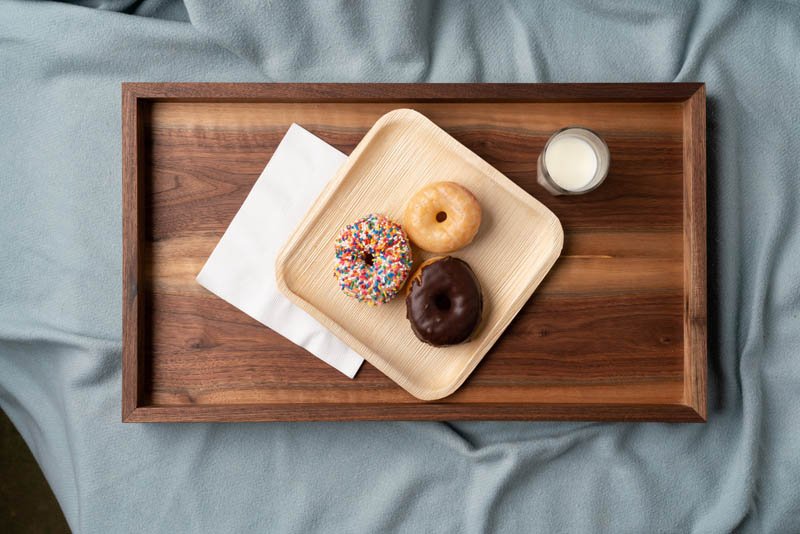Getting To Know Us: Cliff Spencer
A while back I had the opportunity to sit and chat with Cliff Spencer about the specifics of the work he does here at Alabama Sawyer. We discuss his background, a typical day for him, the challenges of the work he does, and several other topics:
What is your background, education, and work experience?
I'm from Birmingham. Went to college at Rhodes College in Memphis Tennessee and worked in theater there. I also did theater in high school in Birmingham. So, I built sets and continued to do that in college. English lit too though, so I'm a liberal arts person.
And then I moved to New York since I wanted to do theater. I worked in theaters doing anything and everything. But, to pay the bills, I started working in wood shops. Also worked for Saks Fifth Avenue back when they had a big production department and built all the indoor displays. I worked at Saks Fifth Avenue but also in other stores around the country. So that was a great experience to learn about woodworking, finishing, upholstery, and everything was done there. From there I worked for other display designers.
I also started working on films. That brought me to Los Angeles where I continued to work in films and on production design. This was where I also worked at wood shops and cabinet shops. Eventually, I got tired of the entertainment business and pursued woodworking. After I met Leigh we moved to Colorado since we had friends there. So we moved to Colorado for a while and worked in some wood shops. Made cabinetry in Aspen. After that we moved back to LA and started our business in 2004.
I think it's really interesting that you used to work on film sets. What did you learn from that position that you were able to carry over to this one?
The first thing that comes to mind is efficiency because we always had limited resources and a severely limited amount of time. For film, the only thing that matters is the end result. What's being photographed. So you have to understand what's important to focus on and what's out of focus. That really trained me to work efficiently and effectively. Furniture is different because everything has to be perfect.
Everything has to be up to our standards of quality. But to get to that standard of quality you have to work efficiently. I've known woodworkers who fuss over one detail forever and never get anything done. Working in film taught me to see the objective, to see the thing that has to get done. You have to do good work, but you also have to make good decisions in a timely manner.
What is your favorite part of the design process?
I guess I like the very beginning when you have ideas to the phase when you are starting to prototype. That is the phase when unexpected things happen. The piece might turn into something you didn’t expect it to. Don’t get me wrong, I like the whole process, but it’s work. Having to draw out every detail and make all these decisions is very painstaking. When you start making that prototype and think, “Oh! I didn’t expect it to turn out like that.” I think that’s really cool.
Can you walk me through a typical day for you here?
Well, one of my jobs today, on Friday, is to make the schedule. I might need to do that with Leigh. But I’m supposed to create the production schedule for the upcoming week based on the deadlines we have. So that I can come in on Monday morning with a full slate and making sure everyone knows what they are doing. So the morning starts with a meeting where I explain the jobs and hand out the jobs to everyone. Then it’s off to the races.
Most of the woodworkers are working on one project, and I have four or five projects I’m supposed to be making progress on that are either prototypes or special projects. Otherwise I’d have to be hand holding the employees.
So I go to work on my various tasks. And they ask me questions or a machine breaks down and I have to figure out how to repair it. Or the mill calls and there is something over there that I need to deal with. Or maybe the Windows OS crashes and I have to get someone to help me fix it.
So then the day is a series of interruptions. But it’s not always like that! My main task is to make sure that all the employees have plenty of work to do. There is a lot of juggling to make that happen.
What is the most challenging/ rewarding part of the job?
The most challenging part of the job is to do all of the work that needs to get done. It’s kind of difficult to get all of the work done on a deadline. We also need to make sure that we are producing work that is up to our standards on time and with limited resources. There’s no room for error but that’s all there is. Errors. Errors abound, that’s what life is like.
The reward is getting to see the finished product. We have all this really cool stuff being made! We have two new prototypes being made and they are looking really good. We have all these completed ice buckets and they are looking really good. We have a compost table that’s nearing completion.
I guess the most rewarding thing is seeing our team succeed.
Well, thank you so much for taking the time to chat with me, I appreciate it.



